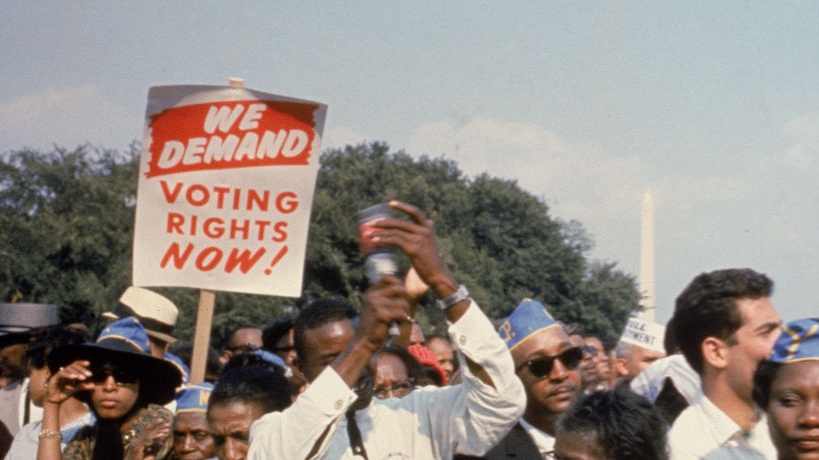Public outrage continues to grow over the arrest of Georgia state Rep. Park Cannon, who was charged with a felony for knocking on the office door of Gov. Brian Kemp as he rubber-stamped a controversial voting bill.
Kemp and other Republican officials were in the room signing SB 202, a wholesale rewrite of Georgia's voting laws giving Republicans enormous control over the state's election apparatus.
In a video circulated on Twitter, Cannon approached the door and knocked on it before two state troopers grabbed and arrested her. Discussion of the arrest and newly signed bill was amplified on Twitter.
Many compared the law and the arrest to those seen during the 1960s at the height of the Civil Rights Movement.
Rep. Park Cannon was arrested for knocking on Brian Kemp’s door as he was signing an egregious voter suppression bill. This is disgusting. These officers had no right to arrest her or treat her so aggressively. They should face repercussions and Rep. Cannon must be released. pic.twitter.com/YueplkTu7I
— Ben O'Keefe (he/him) (@benjaminokeefe) March 26, 2021
How it started (Civil rights activist Mattie Howard Harris, 1963)
How it's going (Rep. Cannon, 2021) pic.twitter.com/A37HNpnlu7
— Exploding Space Pillow Singh, MD ???? (@labyrinthweaver) March 26, 2021
This arrest of an elected official was a CLEAR violation of Article III of the Georgia Constitution: pic.twitter.com/YhHM58YrQw
— Ben Crump (@AttorneyCrump) March 26, 2021
Jim Crow pic.twitter.com/W2zYLLpvUP
— Be A King (@BerniceKing) March 26, 2021
“Re-strategize
Re-organize
Re-mobilize.”Full video of King Center CEO, @BerniceKing, on @CNN tonight with @donlemon discussing #SB202 and #VoterSuppression. pic.twitter.com/fV5JtTpZxa
— The Martin Luther King, Jr. Center (@TheKingCenter) March 26, 2021
Nsé Ufot, the founder of the advocacy group New South, said the bill "is a direct attack on our democracy and on Georgians, who deserve to have their votes counted and voices heard."
"Republicans know that their only hope to win our state is to silence the voices of Georgians of color. That’s why they are launching this vengeful, concerted, racist effort to suppress our votes and our voices. SB 202 was passed and signed into law under the guise of Trump’s Big Lie – the same Big Lie that led to the January 6th insurrection at the Capitol," she said, adding that "fighting to protect the right to vote isn’t new. It’s straight out of Jim Crow.
"Republicans will continue to try to cling to this Big Lie, but we must remember one Big Truth: Georgia is now a blue state. Regardless of how hard Georgia Republicans try to cheat their way back into power, it will remain a blue state. We will continue to fight and we will not back down to Republican fear-mongering, lies, and blatant attempts at voter suppression," she continued.
Higher Heights CEO Glynda Carr told Blavity the legislation "directly attacks the civil rights of millions of voters in Georgia" and noted the disturbing fact that photos show Kemp signed the bill under a painting of a notorious plantation.
"The provisions of this bill, which significantly reduce drop box locations and curb absentee ballot use, will disproportionately impact Black women voters across the state, who have continuously shown up in historic numbers to save our democracy," Carr said.
"The Georgia legislature’s passage of this bill is active, purposeful disenfranchisement of Black women in Georgia, who have turned out in these record numbers despite the already-extensive hurdles that they face to registration and voting. With this law, even receiving water while waiting in line to vote will be illegal, when we know voters in predominantly Black precincts experience longer wait times and lines to exercise their rights," she added.
Tré Easton, the senior adviser for advocacy group Battle Born Collective, told Blavity that the war against Black voters "is unmistakable and I think Republicans in the legislature will come to regret lapping up Donald Trump's Big Lie."
"Something has been awakened, and it's not going quietly. All of it also underscores the need to abolish the filibuster to pass the John Lewis Voting Rights Advancement Act and ensure that voting rights aren't some game that Republicans change the rules to whenever things don't go their way," he explained.
Other states largely controlled by Republicans have passed or are attempting to push through restrictive voter laws as a way to appeal to former President Donald Trump and his supporters, according to The New York Times.
The laws are being presented in the media as restoring faith in elections through veiled references to the lie that the 2020 election was stolen from Trump.
The Brennan Center said that as of Feb. 19, 253 bills have been introduced this year in 43 state legislatures with provisions that would restrict voting access.
These bills generally seek to limit access to mail voting, institute harsh voter ID requirements, push for more aggressive purges of voter rolls and reduce the number of opportunities for people to register to vote.
"Our nation cannot accurately reflect the needs, ideals and realities of the people it is meant to serve until we expand voting access for all of its citizens,” Carr explained.
